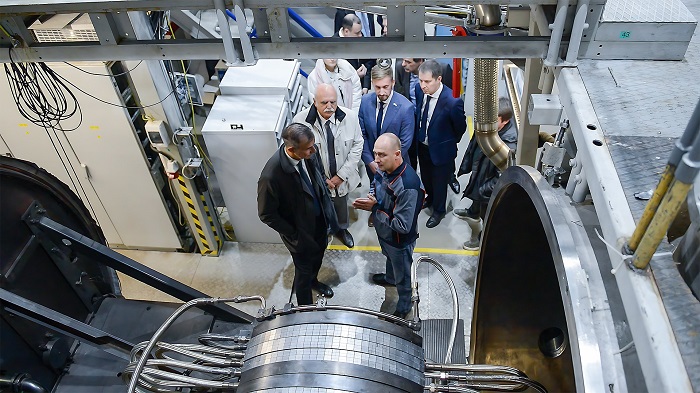
Pietro Barabaschi, Director-General of the ITER International Organization, reviewed the process of development and manufacturing of key Russian systems for the international thermonuclear reactor in St. Petersburg on October 9, within the framework of his official visit to the Russian Federation.
The first point of ITER Director-General’s visit was Efremov Scientific Research Institute of Electrophysical Apparatus (NIIEFA JSC, a ROSATOM enterprise). Pietro Barabaschi held a meeting with the management of the Institute and saw around the facilities for high-tech components manufacturing of the future plant, in particular, the benches involved in the program of the first wall panels and diverter central assemblies manufacturing. During the visit, Mr. Barabaschi was also demonstrated specimens of switchgear finished items, some of them are already included in the next shipment.

“NIIEFA is the major Russian developer and supplier of equipment within the framework of the joint implementation of ITER project. We develop and manufacture a number of systems, without which the reactor operation is impossible at all. A large part of these components has already been manufactured and shipped to the construction site, and this year we will continue to ship the most sophisticated electrical equipment we manufacture. Today, Pietro Barabaschi has had the opportunity to personally see our competencies and assess the level of scientific and production potential of the Institute. Our enterprise keeps fulfilling all obligations on equipment deliveries and tests in accordance with the contracts concluded,” noted Sergey Gertsog, Director of NIIEFA JSC.
The second point on the business program of ITER Director-General in St. Petersburg was Ioffe Institute of Physics and Technology of RAS (FTI). The Institute of the Russian Academy of Sciences manufactures high-tech diagnostic complexes that are critical for the study of a whole range of reactor operation parameters. Director-General of the ITER organization saw over the laboratory complexes for the development of diagnostic systems.
Following the visit, Anatoly Krasilnikov, Director of ITER Project Center (a ROSATOM organization), said, “It is very good that Pietro Barabaschi visited our leading research centers just now, when the project is moving to a new “baseline”. Both institutes are doing a tremendous amount of work on the ITER project. In particular, a series of tests of a promising reactor first wall cladding material has now begun at NIIEFA; the importance of these studies cannot be overestimated. FTI, with its vast experience in the study of plasma physics and the development of diagnostic equipment, is creating complexes that will ensure control over the successful functioning of the future plant. They are being developed in strict accordance with the reactor construction schedule.”
For reference:
ITER is a project of the world’s first international thermonuclear experimental reactor of a new generation, being implemented by the efforts of the international community in France. The objective of the project is to demonstrate the scientific and technological feasibility of using thermonuclear energy on an industrial scale, as well as to develop the necessary technological processes for this. The Project Center ITER, institution of Rosatom, performs the functions of the Russian ITER Domestic Agency responsible for ensuring Russia’s in-kind contribution to the project.
Russia continues to completely fulfill its obligations under the ITER Project. The main contribution of the Russian Federation is the development, manufacture and supply of 25 systems for the future facility. As part of the joint implementation of the ITER Project, a number of key Rosatom enterprises are manufacturing the most important components of the future machine, including: all domes of the divertor, 40% of the first wall panels, switching equipment, blanket module connectors, etc. The shipment of unique Russian equipment within the framework of the joint implementation of the ITER Project is carried out on time in full accordance with the reactor construction schedule.